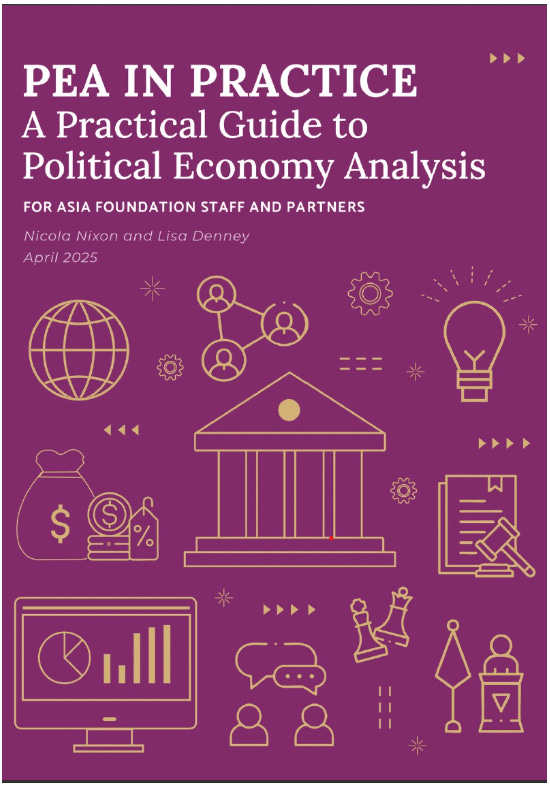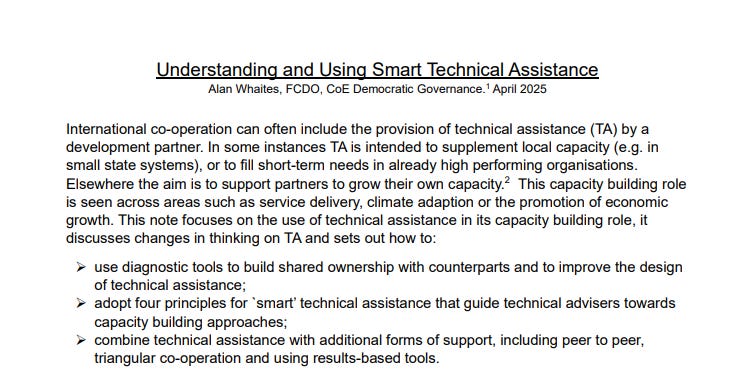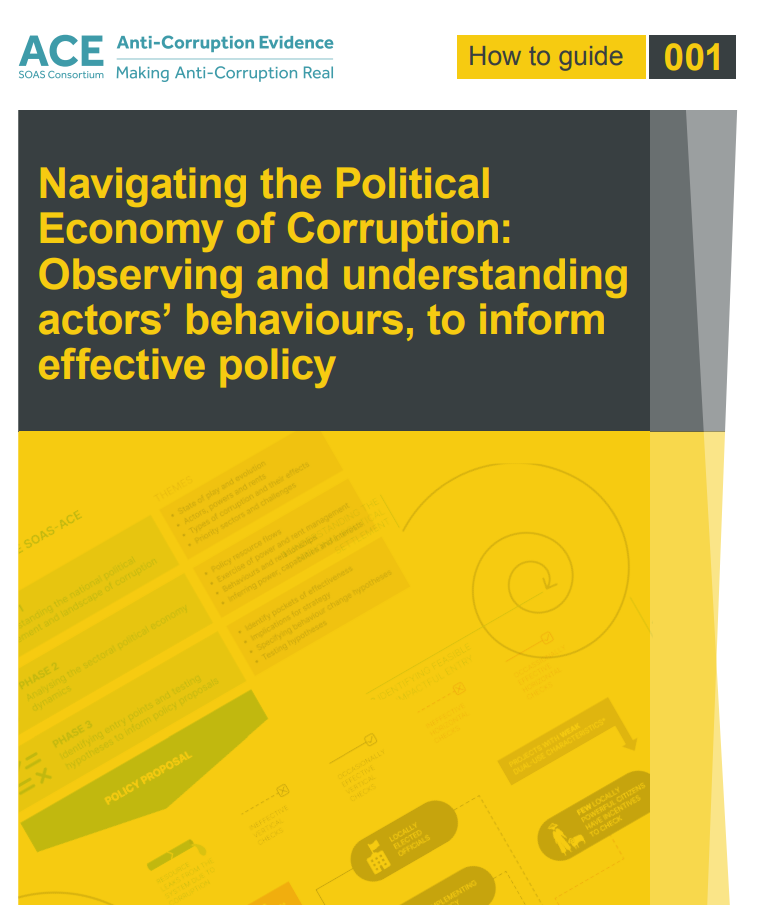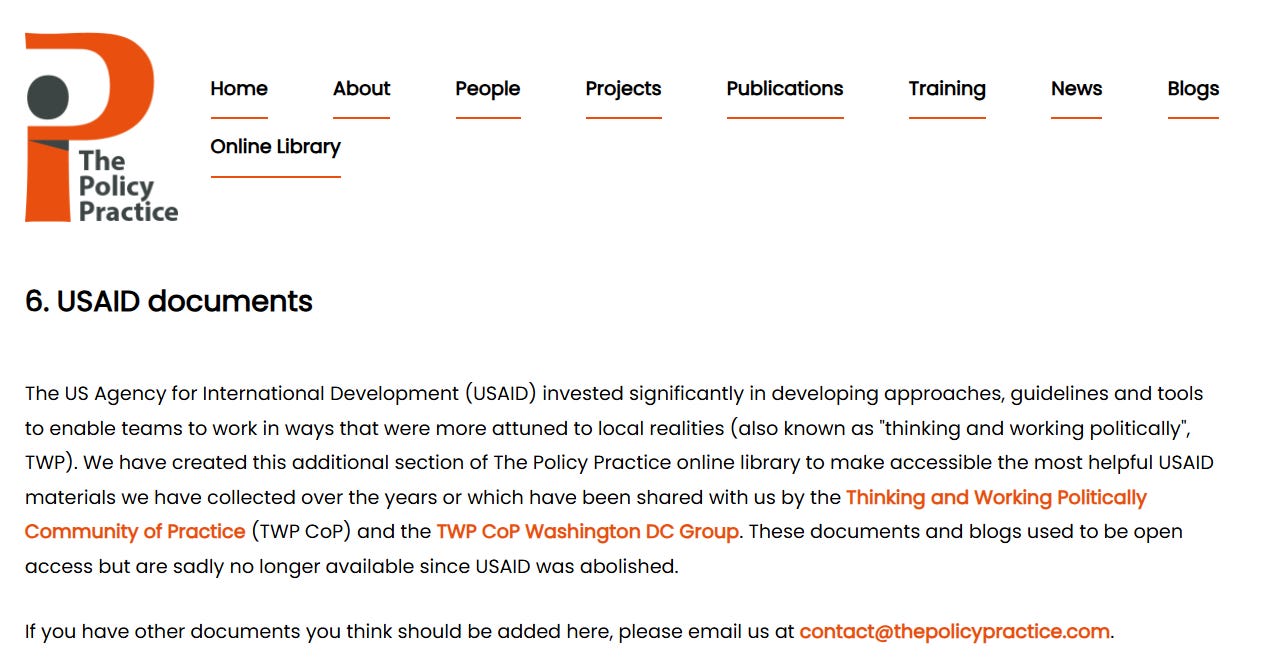May-June 2025 Newsletter
Bringing you the latest news and updates on all things TWP this May-June!
Dear friends and fellow travellers on all things TWP,
Welcome to the May-June 2025 edition of our Newsletter.
Before delving into the contents of the Newsletter, I want to share some news with you that highlight just how challenging work in the field of international development has become since the start of 2025. As many of you likely know, the TWP CoP has had a very active Washington DC Working Group since 2017, led by committed twp-ers such as Derick Brinkerhoff, David Jacobstein, Susan Kemp, Sharon Van Pelt and many others who have worked extensively in or with organisations that design(ed) and implement(ed) US Government funded development efforts. Unfortunately, as a result of the closure of the US Agency for International Development (USAID) and the effect that this has had on development programming, the TWP CoP Washington DC Working Group has taken the difficult decision to suspend formal operations. You can read their full statement here. We are very saddened by this news, and appreciate how tough this time is for colleagues and partners that the TWP CoP has collaborated closely with over the years. As you will see from their statement, however, the DC network hopes to continue to come together in a more informal basis to discuss issues broadly related to TWP as well as to maintain a space of social solidarity and collaboration, and we very much hope to help sustain that sense of community.
Now turning to this edition of our newsletter, here is a summary of what you will find in store:
In our featured interview, we speak with Micol Martini, Senior Expert and Technical Lead on Environmental Governance and Conflict with the World Wide Fund for Nature International (WWF). Micol shares her trajectory and experience in applying TWP in her work previously at the UK Department for International Development (DFID) and the Foreign, Commonwealth & Development Office (FCDO), as well as in her current role at WWF.
To learn about different initiatives taking place in the TWP space, head over to the What we are working on section, where you will find more information about the following:
A paper by Larry Attree, Dr Thomas Martin, Richard Reeve, and Dr Hillary Briffa (published in conjunction with the British International Studies Association (BISA)’s Security Policy and Practice Group, Rethinking Security, and King’s College London Centre for Statecraft and National Security) that puts forth a ‘peace lens’ for the new UK National Security Strategy to respond more effectively to rising threats from conflict, division and autocratisation.
A TPP Working Paper by Richard Barltrop on the need to understand Yemen’s economy through a political economy lens.
A working paper for consultation where Verena Fritz and Rachel Ort from the World Bank explore the role of public institutions in tackling climate change. Feedback on the paper (including examples of institutional challenges and progress) is welcome until 20 June 2025.
Insights and reflections from Lisa Denney and Glenn Bond on a project led by the Centre for Human Security and Social Change (CHSSC) and funded by the United Nations Development Programme (UNDP) that seeks to understand how accountability ecosystems in the Pacific work and why, with a view to developing more effective approaches.
New Guidance anchored in TWP principles and practice:
PEA in Practice: A Practical Guide to Political Economy Analysis by Nicola Nixon and Lisa Denney, published by The Asia Foundation.
Understanding and using smart technical assistance by Alan Whaites, published by FCDO.
Navigating the political economy of corruption: Observing and understanding actors’ behaviours, to inform effective policy by Alan Hudson, Katherine Bain, Mushtak Khan, Pallavi Roy, and Duncan Edwards, published by the Anti-Corruption Evidence Research Consortium at SOAS.
Ongoing efforts to help address (some of) the fallout of the peacebuilding and development agendas in the US, including initiatives from the Accountability Lab, the Georgetown Institute for Women, Peace and Security, and The Policy Practice.
In the What we are thinking about section, Dieter Zinnbauer shares some ideas on how political economy analysis can reach its full potential
As for What we are reading, check out Graeme Ramshaw’s review of Manuel Meléndez-Sánchez’s Journal of Democracy article on ‘Latin America Erupts: Millennial Authoritarianism in El Salvador’.
Last but not least, as always, we bring you the latest publications, events, resources and other news of interest from a TWP perspective.
If there is anything you would like to share with us, including items for future newsletters, please get in touch by email at: info@twpcommunity.org. And please share with your network, and subscribe if you haven’t already!
Oh and please remember: If you are able to, it is better to open the newsletter directly on your browser (click on the ‘TWP CoP May-June 2025 Newsletter’ header, at the top of this page) so that you can get full access to all our content.
With best wishes,
Alina
Highlight feature
Drawing on over a decade of experience as an adviser on conflict and governance with DFID/FCDO and her current role as the Senior Expert and Technical Lead on Environmental Governance and Conflict with WWF International, Micol Martini shares her trajectory on using TWP in her work, including some of the opportunities and challenges of instilling a politically aware lens in conservation work in conflict affected contexts.
Watch the interview here.
Or alternatively, listen to the podcast version here.
What we are working on
1. New Publications
A ‘Peace Lens’ for the New UK National Security Strategy
by Larry Attree, Dr Thomas Martin, Richard Reeve, and Dr Hillary Briffa
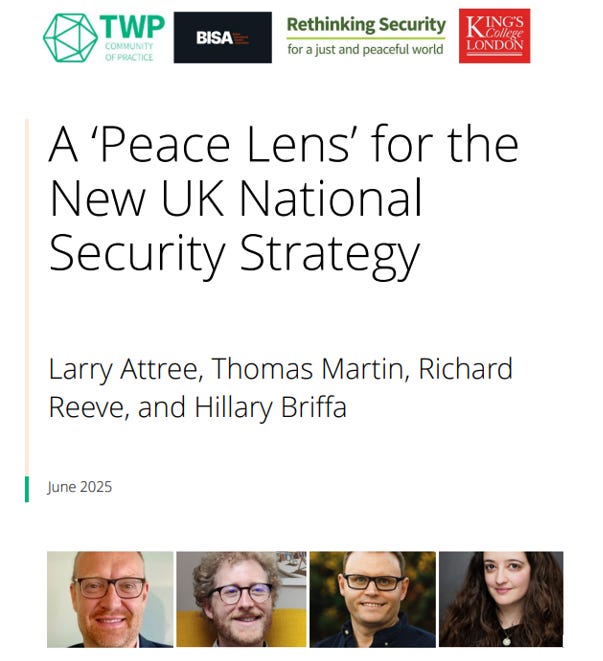
For 20 years, violent conflicts and related deaths have been spiralling, while forced displacement has nearly doubled2 in ten years. Why is this happening? And could a ‘peace lens’ help the UK respond more effectively in its forthcoming National Security Strategy?
In this short piece, the authors discuss the challenges and ways forward, drawing on a roundtable they convened on 1 May 2025 to explore this question. The roundtable, hosted by BISA’s Security Policy and Practice Group, Rethinking Security, and King’s College London Centre for Statecraft and National Security, brought together UK government officials in strategic or analytical roles, relevant academics, think tank/NGO experts and practitioners on ‘Effective peace and security approaches for the UK in a volatile world’.
Understanding Yemen’s Economy: The Need for a Political Economy Perspective
By Richard Barltrop

In this TPP working paper, Richard Barltrop explores how the prevailing picture of Yemen’s economy is incomplete and misleading. Economic estimates ignore large portions of the country. Analyses overlook Yemen’s relative strengths in infrastructure, agriculture and remittances, and overestimate the importance of oil and gas. This inaccurate picture of Yemen’s context has significant consequences, underestimating the country’s capabilities and resilience. The paper makes four recommendations to the international community:
Take a political economy perspective, combining analysis of Yemen’s economy with an understanding of the political and governance situation in the country.
Move away from unexamined assumptions and clichés about Yemen, and instead find and use new sources of data.
Draw on more accurate understandings of Yemen’s economy to contribute to peace efforts.
Use these fuller understandings to rebalance assistance to Yemen, with a shift from humanitarian towards development and peace-supporting aid.
2. Consultation on a working paper
Public Institutions: Critical Enablers for Addressing Climate Change
By Verena Fritz and Rachel Ort
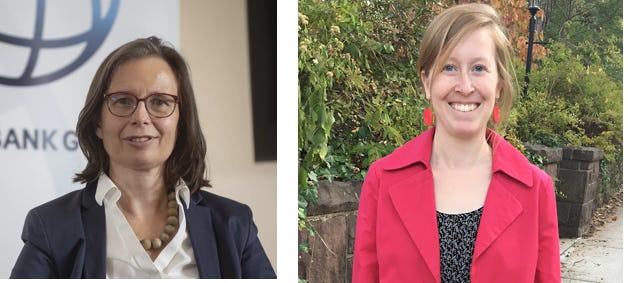
In this working paper for consultation, Verena Fritz and Rachel Ort emphasise the crucial role of effective public institutions in tackling climate change. The paper highlights the need for institutional capacities across a variety of sectors, from managing scarce resources to coordinating complex energy transitions. to translate commitments and financing into tangible outcomes. It argues that traditional public sector management approaches are insufficient. Instead, institutions need to be able to adapt and operate differently. This includes:
Enhancing cross-government coordination
Managing transitions within compressed timescales
Navigating frequent shocks and uncertainty
Utilising data and knowledge effectively
Supporting citizens and businesses in adapting to climate challenges
The authors also stress the importance of calibrated support for institutional development, based on a given country's specific needs, priorities, and starting points, and learning from past efforts to ensure sustainable and impactful progress. They highlight that many of the countries that are most vulnerable to climate change start from a relatively low-capacity base, and efforts to tackle this requires much greater integration of political, technical, and public administration perspectives. Read the full paper here.
Verena and Rachel welcome feedback on this working paper (including examples of institutional challenges and progress) by 20 June 2025 at vfritz@worldbank.org and rort@worldbank.org .
3. Reflections and lessons from a project
The political economy of accountability ecosystems in the Pacific
By Lisa Denney and Glenn Bond
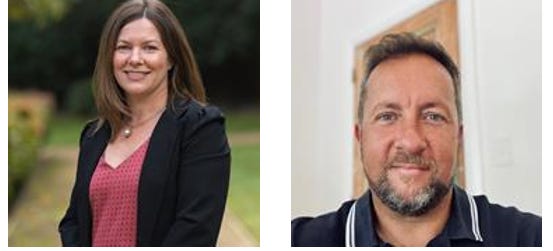
While rising authoritarianism globally suggests that accountable governance is not high on the list of political priorities in 2025, accountability has been wielded as a reform priority for countries of the ‘Global South,’ including in the Pacific, for decades. It has also been recognised as a global priority in the Sustainable Development Framework. Internationally supported initiatives have variously focused on either the ‘demand’ (citizen voice) or the ‘supply’ (government response) side of accountability, or on explicit attempts to combine the two through sandwich strategies and social accountability that focus on the relationship between citizens’ and leaders and the ability to hold them to account. There has also been a stronger focus in recent years on transparency and access to information. Yet, overall, many efforts to improve accountability have failed to gain traction on the ground. This has prompted a process of introspection within the accountability and transparency community to learn more purposefully from what has worked well and less well in this space.
Here, we highlight insights and lessons from one such effort that we have been involved in at the Centre for Human Security and Social Change (CHSSC), based at La Trobe University in Australia. Over the past two years, CHSSC has been working on a UNDP research project funded by the European Union (EU) that looks at accountability ecosystems in the Pacific. The project seeks to better understand how these ecosystems work and why, with a view to developing approaches that can deliver better results. As part of the project, we undertook six country studies, working with national researchers in the Federated States of Micronesia, Kiribati, Palau, Solomon Islands, Tuvalu and Vanuatu. We also prepared a synthesis report that analyses the constraints and opportunities across these Pacific Island states from a political economy perspective, and teases out potential ways in which policymakers and practitioners seeking to foster accountability might work differently taking those as their starting point. … Continue reading here.
4. New Guidance
PEA in Practice: A Practical Guide to Political Economy Analysis, The Asia Foundation
By Nicola Nixon and Lisa Denney
This guide has been developed by The Asia Foundation to assist development practitioners seeking to embed political economy thinking into every stage of programming. Drawing on years of experience with PEA across Asia and the Pacific, PEA in Practice moves beyond theory to demystify how to do PEA in real-world contexts. This guide offers a user-friendly framework, participatory tools, and concrete case studies to unpack power, institutions, and incentives. It is also intended to help practitioners navigate complexity, challenge technocratic defaults, and design politically informed pathways to change through an inclusive approach.
Understanding and Using Smart Technical Assistance, FCDO
By Alan Whaites
This FCDO note discusses the provision of technical assistance within international co-operation. It points to the advantages of combining technical assistance with robust diagnostics and also sets out some principles for adopting Smart Technical Assistance in order to enhance capacity building and partnerships. This guidance from FCDO represents a shift towards more sustainable and locally-driven technical assistance. By emphasising context, collaboration, and adaptability, it seeks to ensure that technical assistance contributes meaningfully to the long-term development objectives of partner countries.
Navigating the Political Economy of Corruption: Observing and understanding actors’ behaviours, to inform effective policy, ACE SOAS Consortium
By Alan Hudson, Katherine Bain, Mushtaq Khan, Pallavi Roy and Duncan Edwards.
In many countries around the world, public policies are poorly implemented, often because the resources invested to achieve the intended outcomes are lost through policy-distorting corruption. This corruption emerges when powerful actors divert resources from policy objectives to serve their own interests, while others lack sufficient power or incentives to challenge them. Such corruption undermines effective policy implementation, erodes trust between citizens and the state, and hinders developmental progress. It is particularly prevalent and persistent in contexts of widespread informality and a weak rule of law, where there is often a mismatch between the ways in which actors and organisations behave and the formal framework of policies and institutions intended to govern their behaviours.
This how-to guide, published by the Anti-Corruption Evidence (ACE) Research Consortium at SOAS University of London, synthesises nearly a decade of research and practical experience to offer policymakers and practitioners a nuanced approach to designing and implementing anti-corruption strategies. It introduces key concepts and provides in-depth guidance, with examples from Bangladesh and Nigeria, of how to understand the national political settlement and the landscape of corruption; analyse sectoral political economy dynamics; and craft and validate feasible policy proposals.
SOAS is also offering a free two-week course on ‘Making Anti-Corruption Effective’. The aim of the course is to investigate the challenges in the fight against corruption and learn how to develop more effective anti-corruption strategies. Register here.
5. Initiatives to help address (some of) the fallout of the peacebuilding and development agendas in the US
Data Collection on the Impacts of the closure of USAID and the CSO Merger
By Blair Glencorse

New Survey
A few months ago, responses to a survey by Accountability Lab and Humentum played a critical role in providing essential information about the cuts to international assistance in the US and in capturing stories about their impact. The data published on www.globalaidfreeze.com helped partners, donors, and the media to understand the scale and effects of the crisis. Now, these stakeholders are once gaian asking for input to understand how the situation has evolved, what challenges development organisations are facing, and where the sector stands. This updated snapshot will provide invaluable comparative insights into the shifting landscape of international development. Please share your experiences if you have been affected by the cuts.
English survey: https://accountlab.typeform.com/aidfreeze
Spanish survey: https://accountlab.typeform.com/aidfreeze-es
French survey: https://accountlab.typeform.com/aidfreeze-fr
Mergers + Strategic Partnerships
If your organisation is facing transitions or tough decisions, it’s essential to take stock of what matters most—your mission, values, and team. What sets your work apart may not be tangible assets, but your ways of working: your service models, your skillsets, your approach to collaboration. That’s why Accountability Lab, in partnership with Digital Public and Development Gateway, has launched a Civil Society Strategic Partnership Toolkit and partner-matching service. These resources are designed to support civil society organisations as they explore restructuring, mergers, or legacy planning with a focus on preserving people, knowledge, and impact.
GIWPS Resource Centre
The Georgetown Institute for Women, Peace and Security (GIWPS) is making a concerted effort to create a hub of resources related to Women, Peace, and Security (WPS) and to preserve documents and data that have been taken down from public platforms or are at risk of removal. Over the course of the next few months, they will be identifying, collecting, and uploading pdf versions of resources to the GIWPS Resource Center on their website. Relevant documents include, but are not limited to: resource guides, policy briefs, government or NGO reports, articles, and press releases. Please share any relevant documents by email at wps.resources@georgetown.edu.
The Policy Practice Library for USAID Documents
As we mentioned in the last edition of our newsletter, in response to what has happened with USAID, The Policy Practice (TPP) has created a dedicated section for USAID in its virtual library in an effort to preserve institutional knowledge related to PEA and TWP. This online resource, which builds on the USAID documents that TPP had been collecting over the years, seeks to bring together USAID publications on PEA, TWP and related themes in one, easily accessible, location. If you have other documents you think should be added to the Library, please send an email to: contact@thepolicypractice.com.
What we are thinking about
Power Positive: Three issues with political economy analysis, one possible improvement
By Dieter Zinnbauer

This article was originally published in Medium.
Political economy analysis (PEA) has become an essential tool when designing and implementing ambitious change projects in the development field, in anti-corruption, with regard to the energy transition and in many other places. Yet as they have been rolled out in practice PEAs often don’t quite seem to reach their full potential. I argue in the following that they often fall a bit short on three interrelated counts. Let me be very clear at the outset: what follows is a) a somewhat simplified account that flags some broad tendencies, but does not do justice to what is a very diverse and rich landscape of approaches and analyses; b) it is not a blanket criticism of the methodology as such or of a particular group of practitioners, but a reflection on some patterns of practice that I am as much gravitating towards as many others, nudged by related habits, remits and contextual constraints. … Continue reading here
What we are reading
Millennial Authoritarianism: El Salvador’s Democratic Crisis and What It Tells Us
A Review by Graeme Ramshaw

In his article Millennial Authoritarianism in El Salvador, Manuel Meléndez-Sánchez offers a timely look at the rise of President Nayib Bukele and what it reveals about the state of democracy in El Salvador—and perhaps Latin America more broadly. The piece opens with the striking image of a leader using a legislative supermajority to sweep away institutional checks on his power. Just hours after securing control of the Assembly in 2021, Bukele dismissed the attorney general and constitutional judges, replacing them with loyalists. The implications were clear: accountability structures had been neutered.
But the real value of Meléndez-Sánchez’s analysis lies in how he characterises Bukele’s model of rule. What he terms “millennial authoritarianism” is more than a catchphrase—it captures a distinct style of governance that merges old-school populism and authoritarian tactics with a slick, digitally native personal brand. Bukele is not just attacking institutions; he’s doing it while tweeting memes, wearing a backwards cap, and calling himself “the world’s coolest president.” His appeal rests on rejecting the traditional political class—what he calls los mismos de siempre (“the same old ones”)—and presenting himself as the people’s champion. … Continue reading here.
Bulletin Board
Courses and Training Opportunities
Political Economy Analysis in Action training course, The Policy Practice and ODI Global (September-December 2025)
This flagship course is designed to equip participants to identify the challenges arising from political economy features of the contexts in which they work, and to draw well-grounded conclusions for policy, strategy, or programme design and implementation. The online course comprises 8 interactive sessions spread over approximately 14 weeks. Fill in an application here before 13 June to benefit from an Early Bird discount. The deadline for applications is 8 August 2025. Visit this link for more information or email training@thepolicypractice.com
Preventing Violent Conflicts course, Swiss Peace (29-31 October 2025 and 5-7 November 2025)
This virtual course over six afternoons provides an opportunity to explore conflict prevention issues and strategies from different perspectives, alongside a diverse group of experts and practitioners. Apply here
Make Change Happen 2.0 course, Oxfam/Open University
This free to access course is designed to assist participants understand the context of the issues they are passionate about and their existing sources of power and influence. Participants can learn about the drivers of positive social change in their roles as changemakers. The course is vaialble in different languages as well. Register here
Intercultural Communication course, Clingendael
This course is designed for professionals working in international or multi-organisational contexts who want to enhance their communication skills and increase their effectiveness in professional settings. The course combines awareness and skills to understand and improve the influence of culture on how you act, think, and communicate with others. Register here
Job opportunities
Practical Politics Platform, Blavatnik School of Government, University of Oxford
The ‘Practical Politics Platform’ [PPP] is a new initiative at the Centre for the Study of African Economies [CSAE] hosted at the Blavatnik School of Government, University of Oxford, and working with the Economic Policy Network (EPN). They are recruiting two core team members to help accelerate the PPP’s development - a Political Economy Specialist and a Programme Manager. Apply before 23 June.
Recent Publications
1. Academic and policy-oriented publications
Accountability Lab. (2025). Civil Society Strategic Partnership Toolkit: Faster and Further Together. Accountability Lab.
This publication provides a guide for non-profit and mission-driven organisations navigating transitions amid significant funding disruptions. Developed in collaboration with Development Gateway and Digital Public, the toolkit addresses the urgent need for strategic planning in response to challenges such as the unexpected stop-work orders (SWOs) announced by the US government and broader reductions in international aid. The toolkit serves as a vital resource for organisations facing the dual challenges of funding cuts and the need for strategic realignment, offering practical guidance to navigate transitions effectively and sustainably. See also Blair Glencorse’s write-up above on Mergers and Strategic Partnerships
Albarracín, B. (2025). Rethinking the Political Economy of Urban Violence and Crime. Chapter in Handbook of Cities and Crime. Edward Elgar Publishing.
This chapter provides an overview of the political economy of urban violence and crime by organising contributions based on their assumptions of state-crime relationships and the central type of criminal actors. It delves into the intricate relationship between urban violence and the socio-economic structures that underpin it. The chapter emphasises that urban violence is not merely a by-product of individual criminal behaviour but is deeply rooted in systemic inequalities and power dynamics within urban settings.
Ali, S. A. M., & Moule, T. (2025). The Impact of Donor Engagement on Bureaucratic Ambition and Motivation in Aid Recipient Countries. Public Administration and Development.
This article analyses how interactions with international donors influence the motivations and ambitions of bureaucrats in aid-recipient nations. Drawing on fieldwork conducted in Pakistan, the authors explore the nuanced effects of donor engagement on bureaucratic behaviour and state capacity. The article underscores the importance of considering the internal dynamics of bureaucracies in aid-recipient countries. They advocate for donor strategies that enhance bureaucratic autonomy and align with national priorities to foster motivation and strengthen state capacity. The study calls for further empirical research to explore these dynamics across different contexts and to inform more effective donor engagement practices.
Agol, D. (2025). Does resilience-building last when projects end? Retrospective lessons from projects to support pastoralists in Turkana, Kenya. Technical Report. SPARC Knowledge.
This retrospective study examines the longer-term impacts of three interventions in Turkana, Kenya, six years after a project ended. The three interventions were: establishing village savings and loan associations (VSLAs); improving water supply; and supporting livestock marketing. The study aims to assess the durability and effectiveness of these interventions post-project, focusing on the interplay between formal institutional structures introduced by the projects and the existing informal social norms and power dynamics within the communities. Findings from the study highlight the importance of aligning resilience-building initiatives with the social and institutional realities of target communities. It highlights the need for adaptive, context-sensitive approaches that respect and integrate local practices and power structures to enhance the sustainability of development interventions.
Aponte, A. F., Asprill, L. M., Botero, F. Johnson, K., Duran, J., & Botero, M. (2025). ‘Total Peace’ in Colombia: Lessons for Negotiating with Organised Crime Groups and Promoting Peacebuilding. SOC ACE Research Programme.
This briefing note offers critical insights into Colombia's Total Peace Policy (TPP), which seeks to negotiate with both politically motivated armed groups and organised criminal organisations. The paper synthesises findings from two research papers to inform policymakers and scholars on the complexities of such negotiations. Drawing on fieldwork in three regions –Buenaventura, Arauca and Tumaco– the note explains how implementation of the TPP provides important lessons and implications for policymakers and scholars in organised crime, conflict resolution and negotiations, and peacebuilding; in particular: the need to understand the evolving nature of violence; the importance of coordinating between local and national authorities; appropriation of the concept of “hybrid political orders”; and the importance of timing and sequencing in negotiations.
Behuria, P. (2025). Donors and Disciplines Meet the Political Economy of Development: The Contested Evolution of Political Settlements Analysis. Progress in Development Studies.
This article offers a critical examination of the development and diversification of Political Settlements Analysis (PSA) over the past two decades. The author conducts a comprehensive review of 75 peer-reviewed publications to trace how PSA has evolved and been interpreted across various academic and policy contexts. The analysis highlights the importance of maintaining the critical and structuralist dimensions of PSA amidst its growing popularity in development discourse. The report advocates for a reflective engagement with PSA that recognizes its diverse interpretations and remains vigilant against the co-optation of critical frameworks by dominant paradigms.
Bühlmann, F, et.al. (2025). Varieties of Economic Elites? Preliminary Results from the World Elite Database (WED). The British Journal of Sociology.
This research note presents an extensive comparative analysis of economic elites across 16 countries, encompassing approximately one-third of the global population and over half of the world's GDP . The study aims to standardise the definition and data collection of economic elites to facilitate cross-national comparisons.
Carothers, T., & Carrier, M. (2025). Democratic Recovery After Significant Backsliding: Emergent Lessons. Carnegie Endowment for International Peace.
This article explores the processes of democratic recovery in four countries—Poland, Brazil, Zambia, and Senegal, that have recently transitioned from periods of significant democratic backsliding to efforts aimed at restoring democratic norms and institutions. The study highlights that while democratic recovery is challenging and context-specific, certain strategies, such as fostering resilient civil societies, strategic political opposition, and comprehensive reforms, are instrumental in reversing democratic backsliding. These cases offer valuable insights for other nations facing similar challenges.
Franz, T. (2025). Resource Governance, Economic Upgrading and Political Settlements in Colombia—No Curse Without Development. Journal of International Development.
This article challenges the prevailing resource curse explanations for Colombia's failure to achieve inclusive development through its natural resource wealth. It argues that historically evolved power balances are at the root of institutional failures to achieve higher value-added growth. By analysing national, transnational, spatial, and geographical developments affecting the interdependency between power and institutions, this article finds that Colombia's political settlement, where landed elites and international actors hold significant power and the state has limited capacities, explains disappointing development outcomes. This power structure has led to a focus on low-productivity sectors and a failure to effectively channel resource rents into high-value activities, perpetuating Colombia's position at the lower end of global value chains. The article contributes to a deeper understanding of the complex interplay between power, institutions, and resource governance in shaping economic development outcomes.
Glenne, J. (2025). The Birth of Global Public Investment: Mutual Interest and Mutuality in 21st Century International Public Finance. Global Cooperation Institute.
This report presents global public investment (GPI) as a new paradigm for international public finance – one that reimagines how the world invests in shared progress. Rooted in the principles of collective responsibility and inclusive governance, GPI offers a future-oriented approach to funding global public goods and sustainable development. The report articulates the context in which we find ourselves, explains the conceptual foundations and practical implications of a GPI approach, and outlines a phased strategy for its advancement. This involves shifting global narratives towards mutual interest and seizing strategic opportunities to embed the values of mutuality into the architecture of international cooperation.
Global Learning Hub for Transitional Justice and Reconciliation. (2025). The Rise of Far-Right Memory Politics: A Global Perspective.
The Global Learning Hub for Transitional Justice and Reconciliation has analysed how far-right actors across the globe are engaged in memory politics to legitimise their ideologies, undermine democratic institutions, and fuel division. This policy brief summarises key findings from case studies on Chile, South Africa, South Korea, and Lithuania, offering strategies to counter the far right’s influence.
Hamad, B. A., Jones, N. A., Abuhamad, S., & Baird, S. (2025). Can Social Protection Contribute to Social Connectedness in Contexts of Forced Displacement and Crisis? Lessons from Jordan’s Labelled Cash Transfer for Education. World Development 188 (2).
Social protection programming can help address gender- and lifecycle-specific vulnerabilities, particularly in humanitarian contexts. Although adolescents are disproportionately affected by crises, there remains limited evidence about how such programming can mitigate risks they face, including social isolation. This article explores how a ‘cash-plus’ social protection response enhances refugee adolescents’ social connectedness and contributes to broader social cohesion and sustainable peace.
Martin-Rozumiłowicz, B. (2025). Political party assistance in Kenya: improving integrity in electorally difficult environments. Political Studies.
This article examines political party assistance provided by key international organisations through a case study of the most recent Kenyan general elections in 2022. The study focuses on the role of political party assistance programs in enhancing democratic processes within challenging electoral contexts. The research contributes to a deeper understanding of the complexities involved in supporting democratic processes in environments with entrenched political challenges. The findings emphasise on the importance of nuanced, context-aware approaches to political party assistance.
Medinilla, A., Dekeyser, K., & Karkare, P. (2025). Green Industrialisation in an Age of Disruption: Africa, Europe and the Global Economy. ECDPM.
This study presents findings from a multi-year research programme on the green industrialisation pathways of African economies within the evolving trade and geo-economic landscape, examining their connections to regional integration, international finance and global decarbonisation . The authors argue for a reimagined economic development paradigm that integrates environmental sustainability as a core component of competitiveness. They caution against the traditional "industrialise first, clean up later" approach, advocating instead for strategies that concurrently address industrial growth and environmental considerations. Achieving this balance requires inclusive policymaking, equitable financing mechanisms, and strategic partnerships that align Africa's industrial goals with global decarbonisation efforts.
Ramis-Moyano, R., Smith, G., Ganuza, E. & Pogrebinschi, T. (2025). Mini-Publics and Party Ideology: Who Commissioned the Deliberative Wave in Europe?, Journal of Deliberative Democracy 21(1).
This study investigates the relationship between governing party ideologies and the commissioning of deliberative mini-publics (DMPs) across Europe over the past four decades. A notable finding is that the design characteristics of DMPs often align with the commissioning party's ideology. Left-leaning parties tend to implement DMPs with higher deliberative quality—characterized by longer durations and larger participant numbers—aiming to enhance inclusiveness and citizen empowerment. In contrast, right-leaning parties are more likely to commission shorter, smaller-scale DMPs. The study concludes that while party ideology does influence the commissioning and design of DMPs, the relationship is complex and mediated by national contexts. Social-Democratic parties have been central to the deliberative wave in Europe, particularly in promoting more robust and inclusive deliberative processes. However, the adoption of DMPs by parties across the ideological spectrum indicates a broader acceptance of these democratic innovations, albeit with variations in implementation reflecting differing ideological priorities
Reid-Henry, S. (2025). Time for a Reset: Development Cooperation at the Crossroads. Peace Research Institute (PRIO).
This article offers a critical analysis of the current state of Official Development Assistance (ODA) and advocates for comprehensive reforms to align development cooperation with contemporary global challenges. The author argues that without significant reforms, ODA risks becoming obsolete. However, by embracing a more inclusive, adaptive framework, development cooperation can remain a vital tool for advancing sustainability, equity, and resilience in an increasingly interconnected world.
Rodriguez-Garcia, G. (2025). How Do Government Integrity Policies Affect Corruption Risks in Political Parties? Evidence for Latin America. Public Integrity.
This article explores the paradox of anti-corruption efforts in environments characterised by systemic corruption, developing a framework to assess changes in corruption risks. Using a comparative case study of four Latin American countries—Uruguay, Chile, Honduras, and Mexico—the study examines how countries with stronger regulatory frameworks for integrity policies—like freedom of information, political financing restrictions, financial disclosure, and conflict of interest and lobbying regulations—affect corruption risks. It specifically addresses political parties, which are central to promoting integrity policies but are often entrenched in corrupt systems. The findings suggest that countries with strong institutional capacities are more likely to cultivate a culture of integrity within political parties, prioritizing transparency and effective corruption risk management, even in systemic corruption contexts. In contrast, weaker institutional frameworks yield limited results from these policies, highlighting the persistent challenges in addressing systemic corruption.
Schmitz, H. P. & Mitchell, G. E. (2025). A Framework for Understanding and Evaluating Localization: The Case of HelpAge International. Public Administration and Development.
This article introduces a nuanced analytical model to assess localisation efforts within transnational non-governmental organisations (TNGOs). The authors propose a two-dimensional analytical framework for understanding localisation initiatives. HelpAge International serves as a practical example of this framework. The organisation undertook significant reforms, including abolishing its central headquarters, to enhance local autonomy and leadership. These actions spanned all four categories of the framework, illustrating the complexity and interrelated-ness of structural and normative changes in localisation. The framework offers a comprehensive tool for analysing and guiding localisation efforts in TNGOs. By distinguishing between managerial and restorative approaches and between forms and norms, the model helps organisations identify where they are in the localisation process and what steps are needed to advance it meaningfully.
Slater, D. (2025). The Authoritarian Origins of the Third Wave. Journal of Democracy.
This article offers a compelling reinterpretation of the democratisation processes that occurred between 1974 and 1991. Contrary to the prevailing narrative that emphasises a surge in liberal democratic movements, Slater posits that this period was primarily characterised by the decline of right-wing authoritarian regimes.
Stokes, S. (2025). Investing in Democracy Means Fighting Income Inequality. Fredrich Ebert Stiftung.
This paper argues that rising income inequality is a central driver of democratic erosion worldwide. It contends that economic inequality not only undermines social cohesion but also fuels political disillusionment, making democracies more vulnerable to authoritarian backsliding.
Tan, Y. (2025). Historical Institutionalism, Political Settlement and Land Ownership System in Nigeria. International Journal of Urban Sustainable Development.
This study examines the evolution of land ownership in Nigeria through the lens of historical institutionalism and political settlements, analysing how the distribution of political power – both vertical and horizontal – has shaped institutional change. Using systematic process analysis (SPA), the research traces the persistence of institutional layering in land governance from pre-colonial times to the present day. The findings reveal that efforts to displace pre-existing tenure systems, particularly during the colonial and post-independence periods, were undermined by weak state enforcement capacity, resulting in a fragmented land tenure system where statutory, customary, and Islamic frameworks persist in legal and administrative tension. The study further highlights how land grabbing, political instability, and clientelist networks have deepened governance challenges, reinforcing legal pluralism and obstructing reform. These findings demonstrate that land reform failures in Nigeria stem not only from legal ambiguities but also from entrenched political settlements that sustain institutional fragmentation.
UNDP. (2025). Community-Based Resilience-Building: A UNDP Guidance Note. UNDP.
This guidance note offers a comprehensive approach to community-based resilience-building that spans disaster risk management, climate adaptation, health risk management, conflict prevention, peace building, and ecosystem management. The Guidance offers generic principles and entry points for UNDP programme design and implementation, while outlining key considerations, supported by case studies, tools and references.
UNCTAD. (2025). Global Trade Update Plus: Escalating Tariffs-The Impact on Small and Vulnerable Economies. UNCTAD.
This edition of the Global Trade Update provides a timeline of the trade policy decisions and an analysis of the impact of “reciprocal tariffs” on small and vulnerable economies. The report finds that in many cases, the reciprocal tariffs disproportionately affect these economies without significantly reducing the US trade deficit or contributing to additional tariff revenue collection.
Urrutia, A., & Matani, T. C. (2024). Promoting Bottom-up Dialogue: A Study of Community-Level Dialogue Experiences in Zimbabwe. Institute for Integrated Transitions.
This report examines grassroots dialogue initiatives across Zimbabwe between 2017 and 2023. The study focuses on 13 community dialogues at ward, village, and district levels, aiming to identify effective, non-partisan strategies for local dialogue and assess their potential for replication at the national level. It seeks to identify successful positive strategies for non-partisan, community-level dialogue and consider their potential replication at the national level to help catalyse meaningful issue-based dialogue among different actors, including political ones. The study suggests that the principles underpinning successful community dialogues, local ownership, inclusivity, and focus on shared concerns could inform national dialogue processes. By adopting a bottom-up approach, national dialogues may become more effective in addressing Zimbabwe's complex political, social, and economic challenges.
Van Veen, E. (2025). Sanctions, Governance and Reconstruction in Syria. Clingendael Institute.
This report explores the intricate relationship between international sanctions, governance reforms, and reconstruction efforts in post-conflict Syria. The report emphasises that while sanctions have historically aimed to pressure the Assad regime, their continued enforcement may now impede Syria's path to stability and recovery. The brief calls for a nuanced reassessment of sanctions, balancing the need for accountability with the imperative of supporting Syria's path to peace and stability.
Vinjamuri, L. ed. (2025). Competing Visions of International Order. Chatham House.
This report offers a comprehensive analysis of the evolving global landscape, focusing on how various states are responding to shifts in U.S. foreign policy and the challenges to the liberal international order. This paper takes stock of these developments, examines the US’s changing role and ambitions as a global power, and explores how 11 other key states are adapting. It examines how states are positioning themselves in this more fractured world, and how some are seeking to disrupt or even undermine the existing order.
2. Blogs, Podcasts and other opinion pieces
Anwar, S., & Dain, M. (2025). On Leadership: What Makes Delivery a Success? Politics and Governance-On Leadership Series. Tony Blair Institute for Global Change.
This commentary delves into the critical factors that determine successful policy delivery in government. Drawing from real-world experiences, the authors highlight the challenges leaders face in translating vision into tangible outcomes. They argue that successful delivery hinges on decisive leadership, integrated planning, and a commitment to transparency and adaptability. Their insights serve as a guide for leaders aiming to transform policy visions into impactful realities.
Aqorau, T. (2025). Moving Beyond Donor Dependency: Lessons from PNA. DevPolicy Blog.
This blog examines the success of the Parties to the Nauru Agreement (PNA) as a model for Pacific nations to achieve financial independence and reduce reliance on donor funding. The author advocates for Pacific institutions to emulate the PNA's model of financial independence and governance. By doing so, they can align development initiatives with local priorities, ensuring sustainability and resilience without the constraints of donor dependency. The PNA's success demonstrates that such autonomy is attainable and beneficial for the region's long-term development.
Building Adaptive Fisheries Governance Capacity project (2025). Building Adaptive Fisheries Governance Capacity: Can adaptive governance improve fisheries management? Global Centre on Biodiversity for Climate.
Dyna Mapeto and Nevarson Msusa of the Community Outreach Unit of the Malawi College of Fisheries worked with the Building Adaptive Fisheries Governance Capacity project team in Malawi and fishing communities to produce a short film introducing the idea and relevance of adaptive fisheries governance. Dr Fiona Nunan, Professor of Environment and Development at the University of Birmingham, also wrote a blog for further insights on adaptive fisheries governance. The project focuses on strengthening governance structures to address challenges such as biodiversity loss, climate change, and poverty in inland fisheries. By adopting adaptive governance principles, Malawi and Uganda can improve the resilience of their fisheries, safeguard biodiversity, and support the livelihoods of communities dependent on these vital resources.
Bussu, S., & Asenbaum, H. (2025). Time to Rethink Democracy: Participatory and More-Than-Human Perspectives. People, Power, Politics Podcast.
This special episode on the People, Power, Politics podcast features a conversation between Sonia Bussu and Hans Asenbaum on democracy, capitalism, climate and the practices and prospects of participatory, deliberative and more-than-human democracy to transform their relationship.
Dercon, S. (2025). Best Buys Meet Political Realities: The Political Economy of Education Research. VoxDev.
This blog explores the disconnect between evidence-based education interventions and the political and institutional challenges that hinder their implementation. The author emphasises that while researchers often identify "best buys"—cost-effective strategies to improve education outcomes—these recommendations frequently overlook the complex political environments in which policymakers operate. Dercon's analysis calls for a pragmatic approach to education policy, one that balances the ideal of evidence-based interventions with the realities of political implementation. By acknowledging and addressing political constraints, researchers can enhance the impact of their work and contribute to more effective and sustainable education reforms.
Levy, B. (2025). 100 Day Update: Protecting the Guardrails of Democracy - Some Lessons from South Africa. Working with the Grain: Integrating Governance and Growth Blog.
Brian Levy reflects on the applicability of South Africa's democratic transition to the contemporary challenges facing the United States under the Trump administration. Levy revisits four lessons he previously identified, assessing their relevance after the first 100 days of Trump's second term. While South Africa's experience offers valuable lessons on democratic resilience, Levy acknowledges it’s limitations as a comparative framework for the current U.S. political climate. The fundamental differences in leadership intentions, commitment to democratic norms, and the nature of ideological movements necessitate a nuanced understanding of how to protect and strengthen democratic institutions in the face of contemporary challenges.
Nelson, A. J., & Gedan, B. N. (2025). To Fight Organized Crime, Latin America Needs a Regional Security Force. Americas Quarterly.
This piece argues that Latin America and the Caribbean must establish a permanent regional security force to effectively combat the escalating threat of organized crime. The authors advocate for the creation of a permanent regional security institution in Latin America and the Caribbean. Such an entity would enable collective action against organized crime, help restore the rule of law, protect democratic institutions, and promote economic prosperity. Without a credible, collective response, the region risks sliding deeper into a cycle of violence, democratic erosion, and economic decline.
Pantuliano, S., Botero, A., Humphrey, C., & Tadesse, A. (2025). Are Southern-led MDBs the Future of Development Finance? Think Change Podcast. ODI Global.
In this episode of the ODI Global Podcast, guests discuss the rise of Southern-led multilateral development banks (MDBs) and whether they are the future of development finance. They explore ideas on what reforms are needed to unlock their full potential.
Rajalingam, G., Denney, L., & Soares, A. (2025). Unpacking the Local Impacts of Foreign Interests in Timor-Leste. DevPolicy Blog.
This blog discusses how foreign interests influence local dynamics in Timor-Leste, focusing on police reform and infrastructure development. Their study, part of the Cross-Border Conflict: Evidence, Policy and Trends (XCEPT) program, reveals that foreign interventions are not directly imposed but are mediated through local political contexts. The authors argue that foreign interventions in Timor-Leste are deeply intertwined with local political dynamics. Effective engagement requires foreign actors to recognize the complexity of local contexts and the agency of domestic stakeholders. A nuanced understanding of these factors is essential for fostering sustainable and equitable development outcomes.
Thampi, G., & Nixon, N. (2025). Small Steps, Big Shifts: How Trust, Timing and Tactics Rewrote Local Governance in Sri Lanka. LSE Blogs.
This blog discusses transformative shifts in local governance in Sri Lanka. The authors emphasise that meaningful change is often gradual and rooted in trust, timing, and tactical approaches. Their analysis underscores that effective local governance reform in Sri Lanka is less about sweeping overhauls and more about incremental, trust-based changes. By focusing on local actors and embedding reforms within existing structures, sustainable and meaningful change becomes achievable.
Events
Upcoming Events
05 June: Crisis or Catalyst? Asia’s Take on the Future of Aid and Development Cooperation. The Asia Foundation.
In light of the shrinking ODA budgets, new actors and financing models reshaping the global landscape, this event seeks to explore questions on what this means for Asia and the future for global cooperation. Register here.
27 June: Global Convening on Strengthening Customary and Informal Pathways to People-Centred Justice: A World Justice Forum 2025 side event. Pathfinders.
Organised by the Working Group on Customary and Informal Justice and SDG16+, the event will showcase effective engagement between diverse justice stakeholders that enhances access to justice and the rule of law, sustains peace, and contributes to land and climate justice. It will also serve as the public debut of the Working Group’s global advocacy campaign on diverse pathways to people-centred justice. Read more and register.
Recent Events
23 May: Converging Crises, Shared Solutions: Applying Lessons from Asia and the Pacific to Global Challenges- A UN DESA Global Policy Dialogue. UNDESA.
This event brought together the UN High-level Advisory Board on Economic and Social Affairs (HLAB) to discuss how Asia-Pacific’s experiences and innovations can inform global strategies, and how the broader international agenda can be grounded in regional context. Watch the recording on Facebook.
12 May: The Future of Foreign Aid: Radically Simple and (or?) Embracing Political Economy. VoxDev.
In this webinar, Rachel Glennerster and Stefan Dercon discuss how foreign aid must evolve in response to budget cuts and changing political dynamics. The conversation focuses on improving aid effectiveness, reducing complexity, and aligning with local political realities. Watch the recording.
06 May: Trust in Turbulent Times: Revisiting Trust and Mistrust in Global Politics. International Studies Association.
This roundtable brought together a panel of experts to discuss the role of trust in today’s uncertain and evolving global political landscape. The discussion revisited Kydd’s concept of calculative trust alongside psychological and sociological perspectives, examining their relevance to contemporary international relations scholarship. Watch the recording.
22 April: Tariffs, Trade and Trump. UK in a Changing Europe.
This event assembled a panel of leading economic and trade experts to analyse the impact of Donald Trump’s new imposed tariffs, and how they may affect both the US and other countries. Watch the recording.
Resources
Aga Khan Foundation’s Learning Hub: This leaning hub combines local knowledge with global practices and makes them accessible as public goods. The learning content on The Learning Hub focuses on: agriculture and food security, civil society strengthening, climate resilience, early childhood development, education, health and nutrition, and work and enterprise.
Ctrl Alt Deceit: Democracy in Danger: This 8-part series podcast, hosted by former CNN anchor Nina Dos Santos and BBC radio voice Owen Bennett-Jones, seeks to explore the threats facing democracy today. The series explores how disinformation, foreign interference, media manipulation, and technological advancements are undermining democratic institutions and public trust.
Economist Education: this is a professional learning initiative launched by The Economist Group in 2021 to provide innovative and practical online courses on current global developments.
Harvard Center for International Development (CID): This research Centre, based at the Harvard Kennedy School, focuses on advancing inclusive and sustainable global development. The Centre works across Harvard University and a global network of researchers and practitioners to convene academic and practitioner networks and deploy breakthrough research to address the world’s most pressing challenges. You can subscribe to their quarterly newsleter to receive regular updates on their ongoing work.
Non Profits Now: Leading Today: This is a new podcast series by the Chronicle of Philanthropy which aims to provide a platform for leaders to share proven approached to working with their boards, managing intergenerational staffs, and hiring and motivating strong senior teams.
The Accountability Tea Podcast: This podcast, produced by the Accountability Lab, unpacks key governance and anti-corruption trends for people interested and working in,the accountability sector.
The Fiscal Space: This site, curated and developed by the Trust, Accountability and Inclusion Collaborative (TAI), serves as a resource for philanthropy to inform investment in fiscal issues.
The Inequality Solutions Portal: This is a public resource of applied global policies driving progress towards a more equitable and inclusive world curated by Pathfinders for Peaceful, Just and Inclusive Societies, the UN Economic and Social Commission for Western Asia, and the London School of Economics’ Atlantic Fellows for Social and Economic Equity. The portal’s mission is to inspire policy innovation and push the bounds of possibility in creating more equitable and inclusive societies for present and future generations.
The World Elite Database (WED): The WED is a cooperative data and analysis project led by an international consortium of scholars on elite populations across the world. Their aim is to help address the problem of comparability and heterogeneity in the study of national power structures, and to foster a cooperative community of scholars interested in studying elite populations systematically.
UNU-WIDER World Income Inequality Database (WIID): This database provides a comprehensive set of income inequality statistics. It presents detailed information on income inequality for 201 countries or historical entities thrpough 2023.
Tell us what you think…we want to hear from you!
Please do not hesitate to get in touch with us for your suggestions and ideas for sections of our newsletter. You can do this via:
- Email: info@twpcommunity.org
- LinkedIn: Thinking and Working Politically Community of Practice
- Bluesky: twpcommunity.bsky.social
- Or by leaving a comment down below



